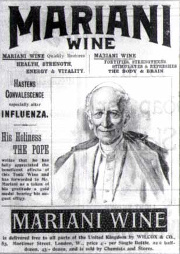 This wine was discussed at The Atlantic in 2013, where it was noted that the American version had a claim that might put off a Pope from consuming it:
This wine was discussed at The Atlantic in 2013, where it was noted that the American version had a claim that might put off a Pope from consuming it:Seeing this commercial success, Dr. John Stith Pemberton in Atlanta -- himself a morphine addict following an injury in the Civil War -- set out to make his own version. He called it Pemberton's French Wine Coca and marketed it as a panacea. Among many fantastic claims, he called it "a most wonderful invigorator of sexual organs."I see from various sources that there was a strong racial element in the campaign to prohibit cocaine, with great concern that it had become particularly popular with the black population and had led to rape and general criminal mayhem. However, one other link said that there was also concern about the large number of deaths from cocaine abuse. One suspects that the racial aspect is emphasised heavily these days by drug reformers to downplay legitimate concern on the drugs health effects back in 1900. Anyhow, this extract from The Nation is interesting:
Around this time, Congress was debating whether to pass the Harrison Narcotics Tax Act, one of the country’s first forays into national drug legislation. This unprecedented law sought to tax and regulate the production, importation and distribution of opium and coca products. Proponents of the law saw it as a strategy to improve strained trade relations with China by demonstrating a commitment to controlling the opium trade. Opponents, mostly from Southern states, viewed it as an intrusion into states’ rights and had prevented passage of previous versions.
By 1914, however, the law’s proponents had found an important ally in their quest to get it passed: the mythical “negro cocaine fiend,” which prominent newspapers, physicians and politicians readily exploited. Indeed, at congressional hearings, “experts” testified that “most of the attacks upon white women of the South are the direct result of a cocaine-crazed Negro brain.” When the Harrison Act became law, proponents could thank the South’s fear of blacks for easing its passage.It would be interesting to see what the history of its prohibition in Britain is like, seeing in that country there presumably no basis to worry about it being abused by a black underclass.
Actually, I see from an article from the BBC that in England, there was a panic over the Chinese in the country promoting both opium and cocaine recreationally. But it also makes the point that the main concern in the 19th/early 20th century was really over excessive drinking, particularly during World War 1.
All rather interesting.
No comments:
Post a Comment